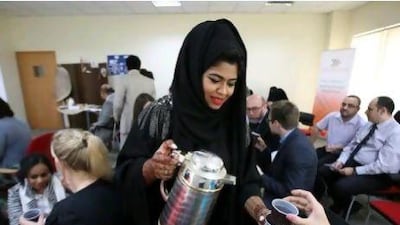DUBAI // A restaurant introducing tourists to Emirati cuisine, a memory game based on farmyard animals and a board game pitting the genders against each other were among the brightest ideas when students from Dubai and Scotland met in a battle of the business schools yesterday.
Four Emirati student finalists from the National Institute for Vocational Education (Nive) took on four from the Stevenson College in Edinburgh to see which young entrepreneurs could come up with the best business plans in a competition organised by the British Council.
The competition was the culmination of an 18-month project which brought the two institutions together, called Skills for Employability under the International Innovators Competition.
Mona Ali Mohammed, 24, won the Nive prize for her project to create an Emirati restaurant to introduce tourists to the local culture and cuisine.
The health and safety student, who has recently finished her diploma at Nive, said: "I've learnt so much through this project like learning to communicate. I didn't think foreigners liked Arabs but now I realise I was wrong. It's helped to open up my mind."
Layla Lewis, 19, won the Scottish prize for her early learning game helping children to develop memory skills, called Pick a Peg, a quiz based on farmyard animals that stimulates memory through repetition.
She said the experience was beneficial for both sets of students. "It's shown us both a different culture, a different way of thinking, yet we both have the same goals."
The main thing was gaining confidence to take her idea and believe in herself enough to take it to the next level, beyond her higher national certificate. "University isn't the only way to succeed," she said. "If it's not university there are other ways to get there."
Scottish student Hollie Stewart, 20, thought up a board game pitting the genders against each other to test their knowledge of the other's interests.
She said gaining international perspective and cultural insight was vital in developing any business. "I had no idea how different Dubai was," she said. "It's a totally different culture."
Now, having completed her diploma, she will intern at a marketing company rather than go straight to university. "Seeing things with my own eyes is more valuable than anything I can learn in a classroom."
Melanie Relton, the head of the programme at the British Council and one of the judges, said the institutional benefits were as great as those for the students involved.
"They are benchmarking curriculums now at the colleges in line with the project on the back of gaining this international perspective," she said. "There have been tutor exchanges and peer observations which will now go on way beyond this project."
She said the international exposure for the students, some who may otherwise not get the opportunity to travel, was vital in an increasingly international market, not least in the UAE.
"Here in Dubai they want young people with an international mindset. With a high young population, there's going to be a need a creation of new industries to match the number of youngsters needing jobs so projects like this foster the businesses and business minds of the future."
In spite of the dominance in Dubai of business and IT related degrees - which account for 60 per cent of degrees - she said a lot of these courses did not teach these skills nor offer such international interaction.
Tarik Al Banawy, students services manager at Nive, said that through the project students had learnt the value of money, the idea of investing, as well as how to communicate with others beyond their immediate circle. "Most don't like to take risks. They prefer a comfortable job with a salary but we are trying to change this perception, teaching them the meaning of risk and doing business."
Hamish Irvine, head of business at Stevenson College said the students had learnt skills such as creativity and built confidence.
"This project is about building a range of skills, focusing on employability, entrepreneurship. It's important that if you're thinking about future success of businesses, we need people with these skills."

